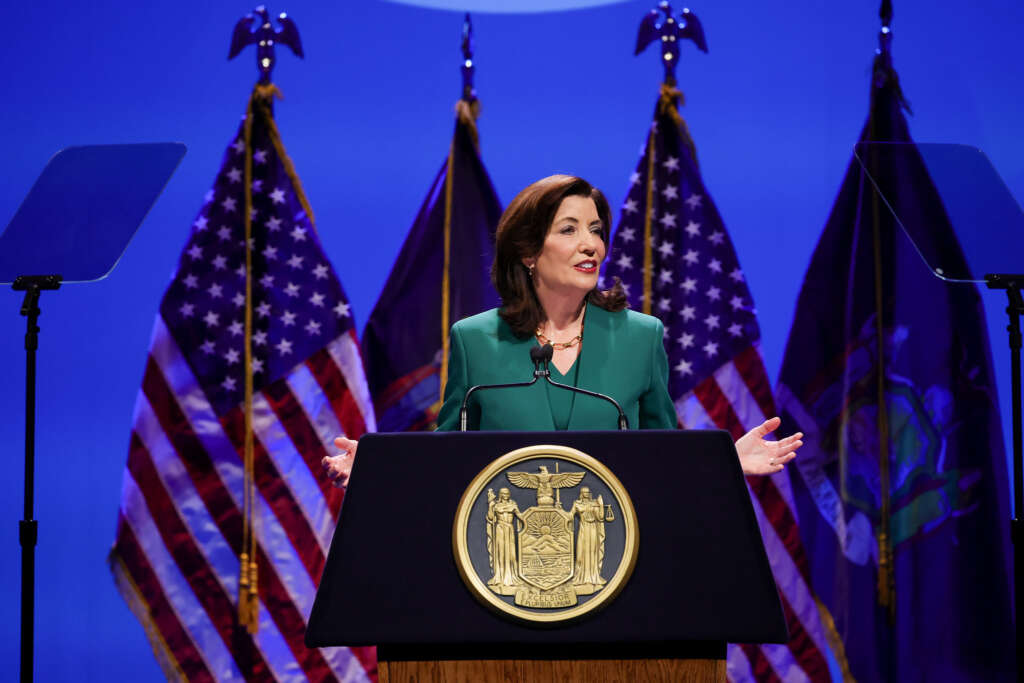“In this year’s budget, Gov. Kathy Hochul has proposed an expansion of mental health forced hospitalization, which would direct law enforcement to approach people who they deem mentally ill—leaving the discretion entirely in policing even in the absence of present threat.”
Gov. Kathy Hochul delivering the 2025 State of the State Address in Albany. (Mike Groll/Office of Governor Kathy Hochul)
We all deserve safety and wellness, and it’s clear to New Yorkers that our government is too often failing to provide this. As elected officials come to realize that New Yorkers will not accept the status quo where thousands of people living with mental illness suffer in our communities without adequate housing or treatment, we’ve seen them rush to share their “plans” to respond.
We need to do something different, but we need to invest in the solutions that actually work. Those solutions must be rooted in treating public health challenges with public health responses, not the same reflexive reliance on law enforcement that has already failed us.
In this year’s budget, Gov. Kathy Hochul has proposed an expansion of mental health forced hospitalization, which would direct law enforcement to approach people who they deem mentally ill—leaving the discretion entirely in policing even in the absence of present threat. This is the wrong approach on many levels, and the state legislature must reject it.
The current standard for involuntary transport to a hospital—which directs police to intervene when they deem a person poses a danger to themselves or others—already creates a problem of relying on law enforcement to determine who fits this standard, and is too often abused to justify harassment of people experiencing homelessness and mental health challenges.
This proposal would create an even more disastrous outcome for people experiencing an emotional crisis by permitting law enforcement personnel to make subjective determinations about who is a threat, and forcibly remove them to a hospital. I commend the governor in understanding that our mental health system has been deprioritized and defunded, but this is not the solution. We need real investments in true public health responses.
As a person who has experienced forced hospitalization, nothing in the plan will lead to de-escalation, and will only bring about a sense of fear and anxiety among people who have, in many cases, already had traumatizing interactions with law enforcement.
In 2014 when I was living in the New York City shelter system, I was victimized by both NYPD and Department of Homeless Services Police, reported as an “Emotionally Disturbed Person,” held against my will unlawfully in numerous city and privately owned hospitals, and forcefully medicated without examination or evaluation.
This impacted my employment and my mental health, contributing to numerous PTSD episodes that leave me in utter fear and isolated. Even after exposing the treatment in a lawsuit, I was again subjected to abuse by the NYPD over a pretext traffic stop (no consent to search vehicle) in August 2023, and subjected to forced medication. If the governor’s plan is permitted, it will lead to confrontation between law enforcement and people in crisis, which NYPD tends to escalate. We will see more New Yorkers subjected to the abuses that I was by the NYPD, DHS and Health & Hospital Corporation.
Following Mayor Eric Adams’ previous push to expand forced hospitalization, more people are already being involuntarily transported to hospitals by police. The city’s most recent data shows that officers involuntarily transported people to hospitals 7,060 times in 2024. That’s almost 20 people per day. It’s no mystery why all of that police intervention has not produced the safety or wellness the Mayor promised us. Forced hospitalization, initiated by police officers, is not treatment, but rather criminalizing people for a public health concern.
Beyond being ineffective, the governor’s proposal could bring deadly results. It will not work to improve safety or public health—but we know what will. We need investments in the resources that keep people well in their communities, like supportive and affordable housing, community based mental health treatment teams, crisis respite centers, mental health clubhouses, and more.
With these resources in place, far fewer people will reach the point of crisis. But when they do, we need to have a fully-funded system to respond with mental health professionals, including peers, rather than police. When people with mental health needs do come into contact with law enforcement, we need off-ramps throughout the system—from pre-arraignment diversion to mental health courts and alternatives to incarceration—to connect people with the treatment they need, rather than languishing on Rikers. Finally, for people coming home from incarceration who have mental health needs, we need strong services and connections in place to help them quickly secure housing, treatment and any other support they need to rejoin their communities.
We clearly need to do something differently around mental health, and this is the time for our governor and state lawmakers to make sure that we’re investing in what works.
Victor M. Herrera is a member of Freedom Agenda, and a resident of Queens.
The post Opinion: Governor’s Forced Hospitalization Plan Will Criminalize Already At-Risk Communities appeared first on City Limits.

